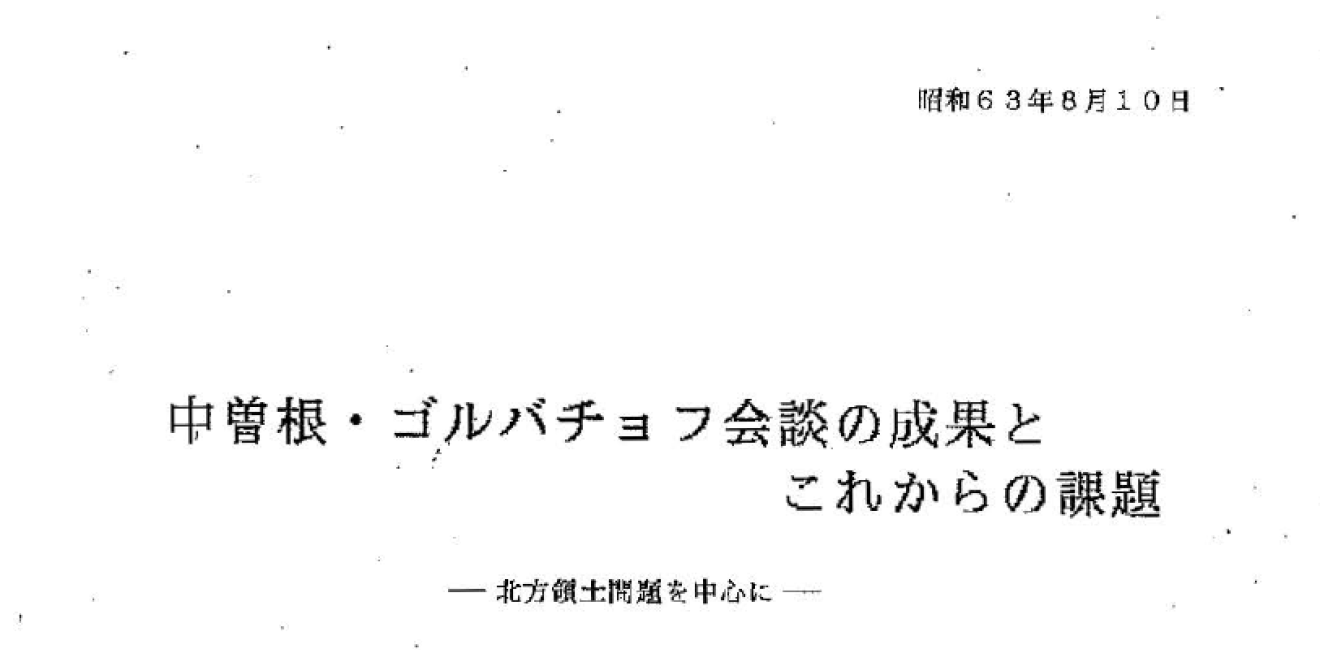On 22 July 1988, former Prime Minister Yasuhiro Nakasone met Soviet General Secretary Mikhail Gorbachev in Moscow as part of a Japanese campaign to recover four islands lost to the Soviet Union at the end of the Second World War: Kunashiri (Kunashir, in Russian), Etorofu (Iturup), Shikotan, and the Habomai Islands, all located off the northeast coast of Japan’s main northern island of Hokkaido.
In the aftermath of the visit, Ichiro Suetsugu, then secretary-general of the Council on National Security Problems (a non-governmental organization with close ties to the Japanese government), wrote a report appraising the former Japanese leader’s performance on his Soviet visit and assessing future issues in the campaign. The document, recently translated and published on DigitalArchive.org, attests to Suetsugu’s remarkable behind-the-scenes influence, shows the arguments of the Japanese and Soviet sides regarding the contested islands, and offers Suetsugu’s suggestions for continuing the campaign to recover the islands.
Ichiro Suetsugu by the late 1980s wielded remarkable influence from behind the scenes over Japanese Soviet policy. Trained in commando tactics at the Futamata Branch of the Imperial Japanese Army’s Nakano School for intelligence officers, Suetsugu served late in the Second World War in Kyushu, where he was involved in organizing local units for guerrilla warfare to counter the expected American invasion. Going underground after the war in Occupied Japan to evade arrest in connection to the wartime killing of captured American aircrew, he emerged from hiding once the threat of arrest had passed.
Suetsugu then devoted his life to Japan’s recovery from its shattering defeat. Working with numerous persons influential both inside and outside of Japan’s perennial ruling Liberal Democratic Party (LDP) and government ministries, he campaigned for the repatriation from Asia of Japanese civilians and soldiers, the release of Japanese imprisoned for war crimes, Japanese and Asian youth exchanges, the abolition of nuclear weapons, the strengthening of relations with South Korea and Taiwan, the recovery of Okinawa from Washington, and that of the four islands of Japan’s “Northern Territories” from Moscow. Devoted to the Emperor and a regular visitor to the Yasukuni Shrine for Japanese who died in the wars of Imperial Japan, Suetsugu was a patriot of the old school, as I wrote in my book, The Shadow Warriors of Nakano (2002).
In his report – a document presumably meant for LDP leaders, relevant government officials, and others involved in the Northern Territories campaign – Suetsugu generally approved of Nakasone’s straightforward performance in his meeting with Gorbachev and his speech at the influential Institute of World Economy and International Relations (IMEMO).[1] He also expressed relief that Nakasone, whom he described as prone to talking too much and political grandstanding, was able to constrain those impulses. The author’s casual and candid tone in describing a former prime minister is evidence of Suetsugu’s status within the Japanese Establishment.
The report presents the arguments of the Japanese and Soviet sides in regard to the Northern Territories. Nakasone claimed the islands were part of Hokkaido and belonged to Japan on the basis of two early bilateral treaties with Czarist Russia: the Treaty of Commerce and Navigation between Japan and Russia (Treaty of Shimoda, 1855) and the Treaty for the Exchange of Sakhalin for the Kurile Islands (Treaty of St. Petersburg, 1875). He also characterized the Soviet seizure of the Northern Territories as Stalin’s “mistake” in an effort to distinguish it from Soviet policy in general.
Gorbachev countered with an argument for recognizing the “postwar realities,” which included respect for the borders established as the result of the Second World War. He also denounced Tokyo’s expectation that Moscow, its fortunes at a low ebb, would “come with its head bowed” in exchange for Japanese technological and other aid.
The report’s final section contains Suetsugu’s suggestions for continuing the territorial campaign following Nakasone’s visit. He began by recommending that Tokyo “reconfirm” its demand for “the return of all four islands together.” He then took Japanese diplomats to task for insufficient efforts to make the Soviet side “understand Japan,” while expressing concern over what he saw as the Japanese mass media’s poor reporting.
Suetsugu was wary of Japanese scholars and critics expressing views that would give the Soviets the impression of anything other than a monolithic Japanese position. In indirect language, he seemed to call for bringing everyone into line. He suggested that Japanese leaders “pay close attention” to media reporting, and argued that it is “a matter of course” that they ask “scholars and critics to exercise caution.”
Suetsugu, diagnosed with cancer in 1999, lost his life to the disease in July 2001. He fought to the end, leading a group of experts in late June that year in calling on the Japanese government to remain firm in demanding the return of all four islands together.
Nakasone passed away at the age of 101 in 2019. Having left office in 1987, he founded the following year the Institute for International Policy Studies (IIPS, renamed in 2018 the Nakasone Peace Institute, NPI) and remained active for three decades in Japanese foreign policy.
Russia to this day retains control of all four islands. Tokyo and Moscow have yet to settle their differences and conclude a peace treaty. Moscow's fortunes have improved markedly from the low ebb of the Gorbachev and Yeltsin years, while Japan's international position has declined from the dizzying heights of the late 1980s.
Gorbachev at that time rejected approaching Tokyo with "head bowed" on the Northern Territories issue in exchange for Japanese technology and other aid. What are the odds that Moscow today would capitulate? Recovery of those four islands off Hokkaido seems a greater challenge today than the day that Suetsugu wrote his report.
[1] Dr. Yevgeny Primakov, a former Russian prime minister and a director of IMEMO, was one of Suetsugu’s close Russian counterparts. Primakov, in his book Russian Crossroads: Towards the New Millenium (Yale University Press, 2004), recalled Suetsugu introducing him “to the top political leaders of Japan.”






